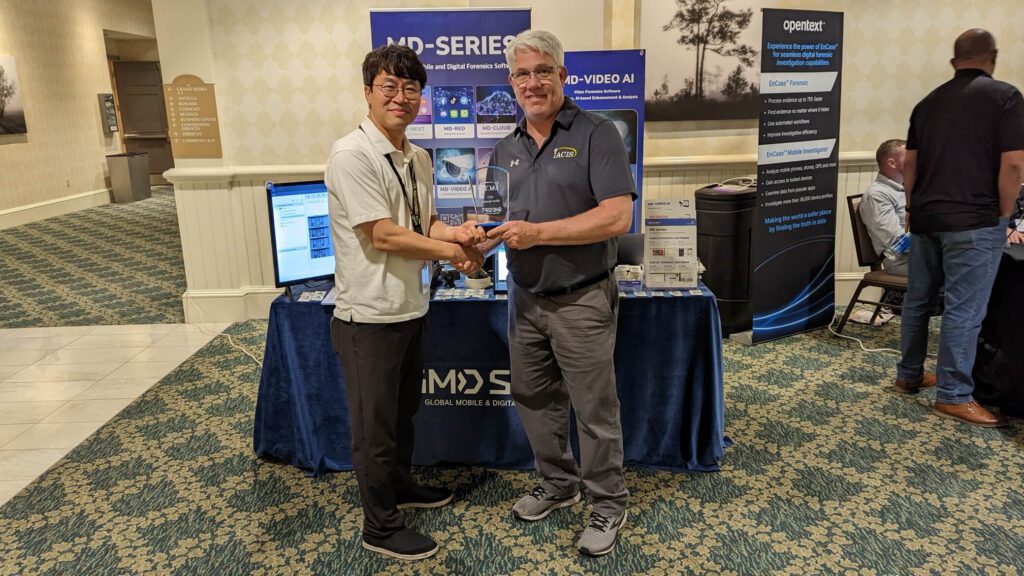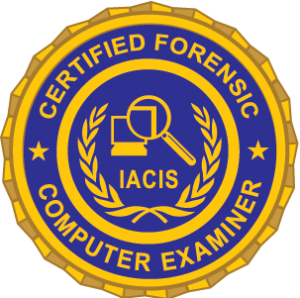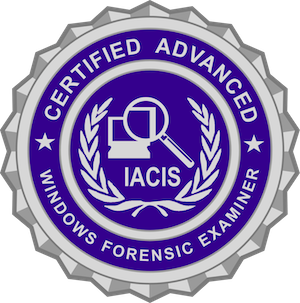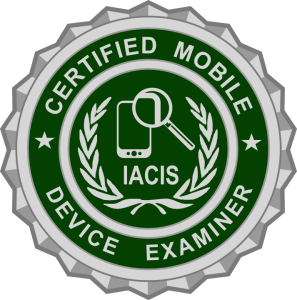We have three types of membership:
Regular members have access to training, certification, an active listserv and forensic research. Regular members can vote and hold organizational offices. To be eligible for Regular membership, applicants must be:
- A current full-time or former full-time law enforcement or government employee (must provide valid email address), or
- A former full-time law enforcement or government employee (must provide proof of former government employment), or
- A current full-time forensic contractor for a government agency (must provide proof or valid email address)
Proof of status will be verified upon application for membership
Associate membership is available to anyone else that is able to pass a background check. Associate members have the same access to the benefits as Regular members with the exception that Regular members can vote and hold organizational offices.
Are you a student?
A student’s initial fee is $100 for full-time students enrolled in an accredited school who are qualified associate members
Are you purchasing a course? For non-IACIS members, the membership fee is waived with the purchase of the training course; however, to register for the course you must complete a membership application at the time of purchase. Purchase training courses on our PRODUCTS PAGE.
IACIS is a non-profit organization. Our mission is to provide training and certification for the digital forensics community in support of its membership. Our vision is to be the premier organization of choice for the digital forensics community by providing law enforcement focused membership services, training and certification.

Becoming a member of IACIS connects you to a global community of digital forensics professionals who are committed to advancing the field and supporting each other’s growth. As a member, you gain access to exclusive training opportunities, valuable certification programs, industry-leading resources, and a vibrant network of peers and experts. IACIS membership also offers ongoing professional development through special events, training, and access to private forums where members exchange insights, best practices, and the latest investigative techniques. Whether you’re new to the field or an experienced examiner, IACIS membership helps you stay at the forefront of digital forensics and opens doors to new professional opportunities worldwide.
IACIS membership benefits include:
- Direct access to experts: Access to a broad community of professional peers
- It’s easy to start the certification process: The Basic Computer Forensic Examiner training course uniquely prepares students for entry into the Certified Forensic Computer Examiner (CFCE) certification
- Maintaining your certification: Members receive FREE annual certification proficiency tests and recertification exams every three years.
- Train with the experts: Members enrolled in the CFCE certification receive one-on-one peer-review training to help prepare for the CFCE certification Exam
- An IACIS Office 365 account
- Afghanistan
- Albania
- Algeria
- Antigua
- Argentina
- Australia
- Austria
- Azerbaijan
- Bahamas
- Bahrain
- Bangladesh
- Barbados
- Belgium
- Belize
- Bermuda
- Bosnia and Herzegovina
- Botswana
- Brazil
- Bulgaria
- Burkina Faso
- Cabo Verde
- Canada
- Cayman Islands
- China
- Colombia
- Croatia
- Cyprus
- Czech Republic
- Czechia
- Denmark
- Dominican Republic
- Egypt
- Estonia
- Fiji
- Finland
- France
- Gambia
- Germany
- Ghana
- Gibraltar
- Greece
- Grenada
- Guatemala
- Honduras
- Hong Kong
- Hungary
- Iceland
- India
- Indonesia
- Iran
- Iraq
- Ireland
- Israel
- Italy
- Jamaica
- Japan
- Jersey
- Jordan
- Kenya
- Korea
- Kosovo
- Kuwait
- Latin America
- Latvia
- Lesotho
- Liberia
- Lithuania
- Luxembourg
- Macedonia
- Malawi
- Malaysia
- Malta
- Mauritius
- Mexico
- Moldova
- Monaco
- Mongolia
- Montenegro
- Morocco
- Mozambique
- Namibia
- Nepal
- Netherlands
- New Zealand
- Niger
- Nigeria
- Norway
- Oman
- Pakistan
- Palestine
- Panama
- Papua New Guinea
- Philippines
- Poland
- Portugal
- Puerto Rico
- Qatar
- Romania
- Russia
- Saudi Arabia
- Senegal
- Serbia
- Sierra Leone
- Singapore
- Slovakia
- Slovenia
- South Africa
- Spain
- Sri Lanka
- Sudan
- Swaziland
- Sweden
- Switzerland
- Syria
- Taiwan
- Tanzania
- Thailand
- Tirane
- Trinidad
- Tunisia
- Turkey
- U.S. Outlying Islands
- Uganda
- Ukraine
- United Arab Emirates
- United Kingdom
- United States
- Uruguay
- Venezuela
- Zambia
- Zimbabwe
I began my journey in digital forensics in 2008, and even after conducting numerous investigations, I still felt uncertain about confidently presenting technical findings. That changed in 2017 when I attended the IACIS BCFE course. It was a turning point — I finally gained a deep understanding of Windows forensics and the foundational principles that every digital forensic examiner should acquire. Earning my CFCE was just the beginning; I later achieved my CAWFE and ICMDE certifications and became a Peer Review Coach to help guide the next generation of CFCEs. IACIS has been instrumental in shaping both my confidence and my career in digital forensics.
As a holder of a master’s degree in criminalistics who entered the world of digital forensics without a formal IT background, my professional journey has been anything but straightforward. In Bosnia and Herzegovina, where digital forensics was for many years underdeveloped compared to other countries, I had to find my own way, learning from online resources, forums, documentation, and whatever else I could access.
Without a formal mentor or structure, I often wondered whether I was heading in the right direction. And then I discovered IACIS.
IACIS wasn’t just a training. It was a validation of everything I had taught myself over the years. It brought me new knowledge, clear methodologies, and most importantly, a deep confidence that I not only could do this work, but that I was doing it the right way.
But IACIS is much more than an organization that delivers training and issues certifications. It is a community of exceptional people, a true family in every sense of the word. A family that shares knowledge, supports one another, and raises the overall standards of our profession. The people I met there are not just colleagues, they are friends who understand the challenges of this field like no one else can.
That confidence didn’t stay confined to my professional life. It carried over into my personal life as well. With less stress, more clarity, and a stronger sense of purpose, I was able to better separate work from home, allowing me to be more present and calmer in my everyday life and ultimately, to keep doing this incredible job.
It’s also important to mention that I became the first and only Certified Forensic Computer Examiner (CFCE) from Bosnia and Herzegovina. A milestone that I proudly carry not just as a personal achievement, but as a symbol of what is possible even when the odds are not in your favor.
That’s why IACIS, to me, is not just about the certification. It is a community, a recognition, and a turning point that helped me become the forensic examiner I am today and the person I strive to be
Coming from an accounting background conducting financial investigations, my transition to digital forensics seven (7) years ago was quite a daunting challenge. Having no formal qualification in the information technology space prior to the transition, meant that I had to quickly and effectively grasp fundamental aspects on how computers and the various operating systems worked and then to understand
how digital forensics can assist us as law enforcement, to obtain evidence from these computers. I became a member of IACIS back in 2016, and in 2017 I was fortunate enough to attend
the BCFE course in Maitland, Florida along with my colleague, which was the beginning of an amazing journey with IACIS and one that helped lay the foundation for my career in digital forensics. For a “newbie” in the field, the BCFE course was the ultimate starter pack and covered all areas that I felt I was
lacking in, including a deep dive into the Windows OS, as well as the procedural and legal matters to consider in the field. A year later I obtained the coveted CFCE certification and following that the ICMDE, both of which were challenging but at the same time extremely fulfilling when finally accomplished. For me personally, the greatest asset of the IACIS is the people, both the elected officials and its members, who go out of their way to assist, and share
advise and tactics via the IACIS listserv when someone in the field has hit a stumbling block in their investigation. This to me is the one reason why I make it a point to
continue to be a member of IACIS, regardless of what question you pose or at what time of day you post it, you can be rest assured that someone will respond to you to try and help resolve your issue. I am forever grateful to be a member of IACIS, and thank those that have been working behind the scenes through its history to get it to where it is now.
I joined the Belgian Computer Crime Unit many years ago and attended the IACIS BCFE Class in 2007, which was pivotal for my career. After becoming an IACIS instructor in 2008, I faced a challenging case involving unfamiliar technology and quickly received crucial support through the IACIS network.
Today, I remain active with IACIS as a Training Committee member and serve as International Training Manager for a global company.
Training is essential for interpreting digital evidence. IACIS significantly changed my perspective on data and its importance as evidence in criminal cases.
IACIS members must demonstrate and maintain the highest standards of ethical conduct. IACIS members must:
Maintain the highest level of objectivity in all forensic examinations and accurately present the facts involved.
Thoroughly examine and analyze the evidence in a case.
Conduct examinations based upon established, validated principles.
Render opinions having a basis that is demonstratively reasonable.
Not withhold any findings, whether inculpatory or exculpatory, that would cause the facts of a case to be misrepresented or distorted.
Never misrepresent credentials, education, training, and experience or membership status.
View the complete IACIS Ethics Policy HERE.
Membership FAQs
Where can I apply for membership?
Please visit our MEMBERSHIP PAGE.
What is the difference between Regular and Associate Memberships?
Associate members do not have the right to vote or hold office. All other benefits are the same.
Are all Regular Members eligible to hold office?
No, according to the bylaws:
3.4.1 To qualify to serve on the Board of Directors as a Director of the Corporation, Regular Members must meet the following criteria:
3.4.1.1 Must be either full-time Law Enforcement or Government Personnel or Former full-time Law Enforcement or Government Personnel;
3.4.1.2 Must have successfully completed the IACIS Basic Computer Forensic Examiner (BCFE) training course;
3.4.1.3 Must hold a current Certified Forensic Computer Examiner (CFCE) certification; and
3.4.1.4 Must be considered a Regular Member in good standing.
–
If I am a Regular Member and retire or leave government employment, will I lose my Regular Member status?
No, if you received your Regular Member status because you were a government employee you will maintain that status upon leaving that employment.
If I became a Regular Member as a full-time government contractor and am no longer assigned to a government agency will I remain a Regular Member?
According to bylaws, if you are no longer a contractor for a government agency your status will change to Associate Member.
Do educational institutions qualify as government agencies for Regular Membership?
No, educational institutions while they may technically be government institutions, they do not qualify for Regular Membership.
Do all potential memberships have to undergo a background check?
No, currently all applicants for associate membership and any former government employee applying for Regular Membership must undergo a criminal background check. This is because current government employees and contractors have checks run for employment.
Will I have to pay extra for the background check?
No, this is included in the application fee.
If I miss paying my dues one year can I still renew?
If you missed the dues deadline at the end of the calendar year, you will have a 30-day grace period to renew your membership at the reduced renewal rate. If you miss the 30-day grace period deadline you will have to renew at the full purchase price for your membership category.




